Linux NAS/iSCSI server adopts Atom
Jan 6, 2009 — by Eric Brown — from the LinuxDevices Archive — 29 views Qnap Systems announced a six-bay (9TB), Intel Atom-based version of its family of “TS” network-attached storage (NAS) devices. The hot-swappable TS-639 Pro Turbo NAS runs Linux on a 1.6GHz Atom N270, and offers RAID 0-6 support, dual gigabit Ethernet ports, an an iSCSI target server.
Qnap Systems announced a six-bay (9TB), Intel Atom-based version of its family of “TS” network-attached storage (NAS) devices. The hot-swappable TS-639 Pro Turbo NAS runs Linux on a 1.6GHz Atom N270, and offers RAID 0-6 support, dual gigabit Ethernet ports, an an iSCSI target server.
(Click for larger view of Qnap's TS-639 Pro Turbo NAS)
Like Qnap's recently release five-bay TS-509 Pro, the TS-639 Pro targets enterprise and small to medium business (SMB) users. Whereas the TS-509 Pro runs Intel's Celeron, the TS-639 is the first Qnap NAS — and the first Linux-ready NAS that we know of — that uses Intel's Atom.
Qnap's previous TS systems, which include the SoHo-oriented TS-109 and TS-209, and the four-bay, SMB-oriented TS-409 Pro Turbo, use Marvell Orion processors running the Feroceon architecture. These earlier NAS devices have received a debian-installer courtesy of former Debian project leader Martin Michlmayr.
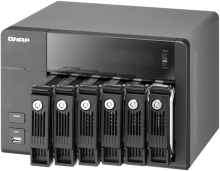
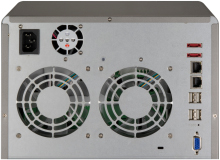
TS-639 Pro, with hotswappable trays, and rear view
(Click on either to enlarge)
The TS-639 Pro's Atom N270 is clocked at 1.6GHz and matched with an Intel 945GSE + ICH7M chipset, says Qnap. Like the TS509 Pro, the TS-639 Pro is equipped with 1GB DDRII memory, as well as a 128MB “disk-on-module” (DOM), where it stores the Linux OS and NAS applications. The device offers six trays, each of which can hold up to 1.5GB capacity for 9TB total. It provides five USB 2.0 ports and two eSATA ports for external storage and backup, and the dual gigabit Ethernet ports can be configured as failover, load balancing, or serving two different subnets, says the company.
The system offers lower power consumption than Qnap's earlier x86 NAS, the Celeron-based TS-509. It draws 86.6 Watts operating, and 33.1 Watts in “sleep” mode (presumably with drives spun down, but Linux idling on the Atom chip). Power savings were gained in part via a chassis redesign, with a move to vertical drives to stop heat from building up underneath the drives.
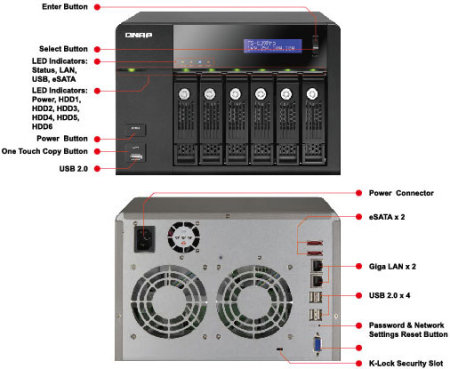
TS-639 Pro features
(Click to enlarge)
RAID support includes RAID 0 (disk striping), RAID 1 (mirroring), RAID 5, RAID 5+ (hot spare), RAID 6, and JBOD (linear disk volume) functions, says Qnap. RAID capacity and migration expansion features are said to ease upgrades to larger storage devices with higher RAID levels. And, RAID can be set up from the NAS's LCD touchpanel, without needing to log into the device from a PC. Other features include schedule power on/off and “wake on LAN” for remote access, as well as monitoring and log systems. AES 256-bit volume-based encryption is now offered for data security.
One key new feature is the ability to set up the device to act as a NAS and an iSCSI target server simultaneously (see diagram below). The latter provides an affordable alternative to a Fiber Channel IP-SAN (storage area network) for storage expansion, says Qnap. The iSCSI server can expand the storage capacity for existing application servers by connecting up to eight iSCSI devices, says the company. A “Virtual Space Allocation” thin provisioning feature is said to enable flexible allocation of capacity for each iSCSI LUN (Logical Unit Number) during set-up, regardless of the physical volume capacity.
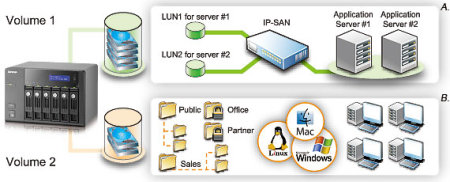
iSCSI and NAS modes simultaneously
(Click to enlarge)
Business server functions embedded in the NAS can be accessed across Linux, UNIX, Mac, and Windows platforms, says the company. In addition to the web-, print-, file-, and other servers listed in the spec list below, Qnap offers a “QPKG” service that enables users to add a growing list of open source software packages for TS systems that were written by Qnap or developed for the platform by the Linux community. These include Qnap's own MLDonkey eMule program, Slim Server on Turbo Station from Slim Devices, and Python.
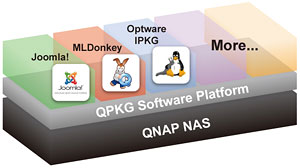
QPKG architecture
Specifications listed for the TS-639 Pro Turbo NAS include:
- Processor — Intel Atom N270 1.6GHz with Intel 945GSE + ICH7M chipset
- Memory — 1GB DDRII RAM
- Flash — 128MB DOM
- HDD storage — 6 x 3.5-inch SATA I/II HDD bays, supporting up to 1.5TB drives in each for 9TB, with hot-swappable and lockable trays
- Networking — 2 x gigabit Ethernet RJ-45 ports (Intel 82574L)
- USB — 5 x USB 2.0 ports (one front-facing)
- eSATA — 2 x eSATA ports
- Status display — LCD panel with backlight
- LED Indicators — status for six drives, plus LAN, USB, eSATA, power, USB, LAN
- Buttons — power, USB one-touch backup, reset, enter, select (configuration)
- Security — AES 256-bit volume-based encryption; K-Lock security slot
- RAID — RAID 0-6, plus RAID 5+ and JBOD
- Major server functions:
- FTP server
- Printer server (max. three sets)
- DDNS support
- Web server with built-in phpMyAdmin
- Joomla (open source content management system)
- MySQL/SQLite and MySQL server
- Editable php.ini
- UPnP/DLNA media streaming (via built-in TwonkyMedia server)
- iTunes server
- HTTP/FTP/BT download server
- Encrypted remote replication by Rsync
- Dimensions — 6.9 x 10.1 x 9.3 inches (175 x 257 x 235mm)
- Net weight — 11.46 lbs (5.2kg)
- Power supply — input 110-240V AC, 50/60Hz; output 250W
- Power consumption — 86.6 W (operating) 33.1 W (sleep mode) with all six drives installed
- Temperature — 32 to 104 deg. F (0 to 40 deg. C)
- Fan — 2 x fans (9cm, 12V DC)
- Operating system — embedded Linux; supports file sharing across Linux, UNIX, Mac, and Windows platforms
Availability
Qnap did not provide pricing or availability information for the TS-639 Pro Turbo NAS. More information may be found here.
This article was originally published on LinuxDevices.com and has been donated to the open source community by QuinStreet Inc. Please visit LinuxToday.com for up-to-date news and articles about Linux and open source.